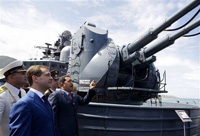Russia tries to smack Washington in the eye. Hit or miss?
The military exercise of Russian and Venezuelan navies attracted a lot of media attention in the West. The majority of respectable Western newspapers wrote about the event with derision claiming that it could not pose a threat to the United States. Others drew a parallel with the Cold War and the Caribbean crisis of 1962. ‘The Russians return to the Western Hemisphere,’ ‘Moscow challenges the West’ – these were typical headlines about the joint naval exercise.

Expert Johanna Mendelson Forman said that the exercise posed no danger to the security of the United States whatsoever. Many German newspapers share the same opinion. Germany’s Handelsblatt, for example, published the statement from Venezuelan President Hugo Chavez, who said that the exercise was not meant to provoke or intimidate anyone. He also said that Venezuela was not going to become a new cold war base in the Caribbean Sea.
British journalists believe that the exercise was held as a response to Washington-led policies in Georgia. They also reminded that Caracas used to hold such maneuvers with the USA before.
Britain’s The Times wrote that the first-ever visit of a Russian leader to Venezuela and the beginning of the joint exercise was not a mere coincidence. Le Temps of Switzerland wrote that it was the most contradictory aspect in Medvedev’s Latin American tour.
To put it in a nutshell, the Western media believe that Moscow and Caracas attempt to challenge the US influence. Many newspapers wrote that the Russian navy arrived in the Caribbean Sea with a political goal to demonstrate the Russian military power to the USA and warn the US administration against unreasoned actions as far as Georgia, Ukraine and the missile defense in Eastern Europe are concerned. They believe that the Russian bear is using Chavez to give Washington to understand that it could crawl into its backyard otherwise.
The majority of experts believe that Washington should be more concerned about Moscow’s nuclear and economic cooperation with the oil-rich region.
The Washington Post wrote that Venezuela was not dangerous for the USA. However, Chavez, the newspaper wrote, may become Obama’s biggest problem in the region with his crusade against the US influence and Russia ’s support in the background.
The Christian Science Monitor wrote that many Venezuelans oppose the increasing presence of Russia in the region, claiming that their nation could become even a bigger outlaw than it was before as a result of such cooperation with Moscow.
US publications believe that the United States can not continue the isolation of Chavez ignoring Russia. They believe that it must make Obama give his own response to the matter: to improve relations with Russia and retrieve the US influence in the Latin American region. An expert of Reuters wrote that Venezuela became a good opportunity for Russia to hit Washington in the eye.
Moscow was not paying much attention to Hugo Chavez in spite of the fact that Venezuela signed a number of billion-dollar deals to purchase Russian arms. However, Moscow changed its attitude to Venezuela after the recent military conflict in South Ossetia.
The Weekly Standard wrote that the naval exercise was simply a nonrecurring event held with a symbolic goal to tease the United States. It will take years, the newspaper wrote before Russia could hold such events on a regular basis. A military exercise like that is a very expensive undertaking, whereas Russia has too many home problems to deal with as far as its defense industry is concerned.
The Los Angeles Times openly laughed at Russia’s efforts in the Caribbean Sea. The newspaper wrote that the Russian Navy was posing a threat to its own servicemen. The publication referred to a statement from the Commander of the Russian Navy who said in 2004 that the Pyotr Veliki cruiser (Peter the Great), which took part in the joint naval exercise, was in a poor condition and could explode at any moment.
Stratfor’s George Friedman believes that the USA was looking at Russia through the prism of the 1900s when the Russian defense industry was ruined and the entire state was paralyzed as a result of the political and economic collapse. It is worthy of note that the Pyotr Veliki nuclear cruiser was launched only ten years ago and will thus operate normally for another decade.
Italy’s Corriere Della Sera wrote that the Russians need to work a lot to remove the gap between the national and the foreign navies. When Moscow sent its battleships to Venezuela, many foreign experts wondered if they were ever going to reach their destination.
Indeed, the West is perfectly aware of the deplorable state of the Russian navy – that is why it is difficult for Russia to impress the West at sea.
Sergei Balmasov
Subscribe to Pravda.Ru Telegram channel, Facebook, RSS!





